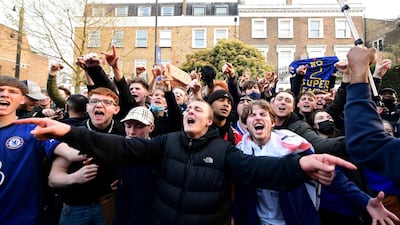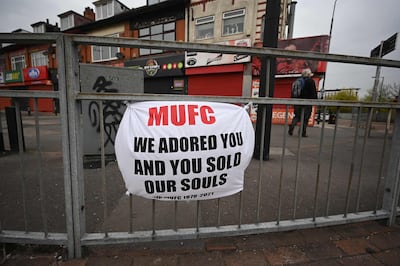When Mohamed Al Fayed owned Fulham FC, the billionaire Egyptian would appear on the pitch before every home game, waving a scarf in the team's colours and rapping "we're not Real Madrid, we're not Barcelona, we are Fulham FC, and Al Fayed's the owner" to the tune of Volare.
There was something amusing about the spectacle of the Harrods tycoon fooling around. But we fans did not find the words especially funny: we yearned for our football club to be like Real Madrid or Barcelona. The fact it had a super-rich proprietor who was not prepared to invest accordingly, to make Fulham so illustrious, and then sang along to that effect, merely grated.
It’s this conflict that lies at the heart of the controversial - and now aborted - plan disclosed this week by some of Europe’s top clubs to form their own Super League. The mooted ESL was instantly and widely condemned as being about a group of “greedy” high rollers attempting to become even richer, ripping out the “soul” of football, trying to “steal” the beautiful game.
The ESL’s collective public relations were dreadful. They offered no real explanation for the scheme, they seemed to assume that because of who they are the idea would be accepted. It may be no coincidence that two main drivers were the Agnellis at Juventus and the Glazers at Manchester United, owners who are used to getting their way without much hard work being involved.
There was no “softening up”; the news was just sprung without warning. The TV companies that pay and partner with them did not know. They failed, miserably, to get the advance backing of influential figures – possibly for fear of leaks – but it meant they were left gasping when the likes of Jurgen Klopp, the Liverpool manager, were critical. Star players, too, joined in the opprobrium.
Neither did they appear to have thought about how the sport’s snubbed governing bodies might react, nor that the authorities would bar players at the ESL clubs from playing for their national teams.
And they were clearly not expecting the furious reaction from governments, especially in the UK, where Prime Minister Boris Johnson, always seeking an opportunity to push his “levelling up” agenda, seized on the open goal they presented and rushed to join in the chorus of vitriol. They were betraying ordinary people, he said. Mr Johnson promised to drop a typically unspecified “legislative bomb” on the proposal.
Within 48 hours of its unveiling, the ESL saw the withdrawal of the six English participants. In the future, the league may well be taught at business schools as a case study in how not to launch something. It really was that terrible.
Yet the schism that drove the clubs to form their own “super league” remains. Fans of European clubs dream of their team sitting atop the domestic league or holding aloft the European Champions League trophy. If someone comes along with wads of cash and buys the club and sets about acquiring superstars, they’re thrilled.
They don’t stop for a second to question how those wealthy people and companies became rich and what actually motivates them. How many Liverpool supporters welcomed a US tycoon like John W Henry swooping in to purchase their club and thought: why?
Mr Henry is not doing it out of the goodness of his heart. For some owners, a passionate love of the sport will always be the primary motivation for taking over a football club. But for him, Liverpool is not a charity and this definitely is not pro bono. Profit is his imperative, as it is for the Glazers and other proprietors. For them, the team is one more addition to their worldwide investment portfolio.

Fans and owners share a common bond: they want their club to do well. But for many businesses and corporates behind the biggest, most commercially successful and internationally marketable teams, that is a means to an end – a step towards making even more money. So, when that objective is exposed by the blueprint for the ESL, something called “the football community” reacts in horror.
That community includes Prince William and now the British Prime Minister. Quite how Mr Johnson, an avowed free marketeer, believed he could justifiably intervene in a scheme put together by private organisations is unclear. But then there are votes to be had.
Some of those who railed loudest against the exclusivity of the ESL are the very same who prospered hugely from the development of the Premier League in England and the wider growth of European club football, courtesy of soaring TV rights. Gary Neville, the Sky Sports pundit, did not hold back in his broadside. Yet, this is the same Gary Neville who played for Manchester United when they put an international club match, complete with worldwide TV audience and royalties, ahead of participating in the time-honoured English FA Cup. Neville has made his name and been paid handsomely by Sky, the subscription-only TV channel that more than any other has boosted the amount of cash coming into the professional sport.
Likewise, another outspoken opponent of the ESL, Gary Lineker, called upon fans to “stand as one against this anti-football pyramid scheme”. He is the highest-paid BBC television presenter, whose Match of the Day programme usually begins with games involving the same “Big Six” clubs who tried to form the ESL. Lineker, possibly not content with his seven-figure BBC package, also pops up on the subscription-only BT Sport channel to host their European Champions League fixtures.
Lineker used to play for and still supports Leicester City, a club that has enjoyed considerable success in recent years, most famously when it came top of the Premier League thanks in part to its mega-rich Thai backers. When Leicester were building a formidable team and attracting big-ticket managers in Claudio Ranieri and Brendan Rogers, Lineker was not complaining.
For a clutch of funders to strive to go further and to seek greater profits is entirely natural. It’s what they do and it’s why they’re rich.
It was also completely predictable after the Football Association in 1991 advocated the formation of a new Premier League. At the time, 12 clubs said they would join initially, among them what was then the “Big Five”: Manchester United, Liverpool, Everton, Arsenal and Tottenham.
The Football League was against the move but powerless to resist. A year later, Rupert Murdoch’s Sky stole a march by winning the TV rights to live Premier League football in a five-year, £304 million deal. When that was renewed for £670m over four years in 1996, the sport was changed forever and the cash truly flooded in.
The ESL is only an extension of what began back then – and what the likes of Neville, Lineker and the rest were only too happy to go along with.
Critics maintained that what especially rankled this time around was that the new super league would not have relegation. The 12 founders were guaranteed 23 years of membership. But is this such a surprise given several of these clubs are financed by Americans, who come from a system that does not allow teams to drop out of major sports?
We’re keen for their money, yet we’re not prepared to ask ourselves whether we would be comfortable investing if we faced losing millions in the event that a player missed a sitter, a goalie had an off-day, a star player drank too much the night before or the referee made a wrong decision. There is a clue as to their thinking and reasoning, as well as their wish for greater certainty, in the ESL planning document where it discusses a new set-up using “technology-enhanced rule implementation”.
The weight of expectation that we place on owners is enormous, whatever the level. In 2014, a friend of mine, Paul Casson, bought my hometown club of Barrow in the north-west of England. He’d made a lot of money in telecoms in the US, had watched the team as a boy and felt as if he was giving something back, saving what was then a struggling club from bankruptcy.
The fans and the town were delighted. But then they demanded more. The supporters called for fresh signings; the local Labour council would not go 50/50 with him on a new stadium, even though he said they could use it for schools and societies outside match days – the councillors argued he could afford it and that he should pay. In the end, Paul bowed out.
One call now being made is for the scuppered ESL to become a watershed, for club ownership to be handed to the fans. How would this work in practice? Would it be any different? It ignores the reality that two of the would-be ESL participants, Barcelona and Real Madrid, already belong to the fans.
The “football community” and governments and politicians and some sections of the media have got their way – the owners have not got theirs. The ESL clubs are licking their wounds, but the point has been made. They may receive an even greater share of the TV proceeds as a result of this but that may not be enough to pacify them. In which case, no one should be shocked and disappointed if some of them walk away, to put their capital somewhere else.
Their opponents can’t have it both ways.
Chris Blackhurst is a former editor of The Independent, based in London



